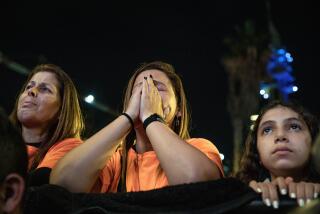Creating Lasting Wounds on Innocent Victims : Gulf crisis: Jordan has suffered greatly from its support of the embargo against Iraq, but does the world care?
- Share via
AMMAN, Jordan — Most of us living in civilized societies generally operate on the assumption that in international affairs, as in everyday life, politics should be predicted on the fundamental premise that people do matter. Needless to say, that assumption is not always upheld by nations and the men who lead them.
That is precisely what we are witnessing today because of the gulf crisis. Industrialized nations and their allies in the region have moved in a lock-step since August in protest against Iraq’s invasion and occupation of Kuwait. They have participated in an United Nations embargo against Iraq. They have, however, woefully failed to give adequate recognition to the fact that economic embargoes, like toss-away insults in daily life, can create lasting wounds on innocent victims.
Jordan has been wounded grievously because of the gulf crisis. Jordan has joined the international community in implementing U.N. sanctions on Iraq--which was, until recently, our biggest trading partner. Ironically, now we find ourselves bearing the tragic, and unsustainable, burden of being on the “right side.” The U.N. Charter clearly implies that no member country facing special economic problems as a result of compliance with embargoes directed against another states should suffer unduly.
The Ripert Report, which was commissioned by the U.N. secretary general not long ago, said that Jordan’s losses for 1990-1991 would be at least $5.2 billion. This figure does not include losses of assets and savings by Jordanians living in Kuwait, which could add another $3 billion, according to U.N. estimates. Jordan thus stands to lose up to 60% of its gross national product.
Other factors include the loss of jobs and assets of Jordanians previously employed in the oil-rich Persian Gulf; the cost of resettling the returnees in Jordan; monumental increases in the price of oil, and the demographic transfer into Jordan of new numbers of Palestinians.
Plainly put, there is a limit to what can be endured by Jordan. We can hardly cope with our current burdens, let alone with the nightmare of a mass demographic transfer. And global leaders appear to be proceeding as though people did not matter, particularly Jordanian people.
How has the world community responded to our pleas for assistance? At best, feebly. Although the extent of Jordan’s economic losses has been well-documented by a number of international agencies, we have received less than $200 million in aid. It’s a miracle that we have managed at all, and our economic survival certainly has had little to do with those who have called themselves our traditional friends and to whom Jordan has more than amply demonstrated its friendship.
We recognize, of course, that in international affairs--as often in everyday lives of ordinary people--there are wheels within wheels that account for the actions of nations and their leaders. No doubt that our economic burdens would be lighter, and some of our debts would be forgiven, had Jordan been less consistent in keeping open channels of communications in pursuit of a peaceful solution to the gulf crisis.
I like to believe, however, that membership in the comity of nations in this time of widening democracy offers member states the right to make democratic decisions. So why should Jordan not be permitted to fashion its own stance? Why should we have to subscribe to a chorus of shrill voices that may not be necessarily right?
We are clearly paying the penalty for subscribing to our time-honored principles of moderation and discourse. The question now is, how long can we afford paying that price?
The question also is, does anybody out there really care what happens to Jordan?
For a country such as Jordan, which does not possess revenue-generating natural resources like oil and natural gas, survival--let alone accelerated economic development--depends on the support and cooperation of the international community. But that community hasn’t accommodated us lately, even though Jordan believes it has more than shown its spirit and strength in the common cause of peace.
More to Read
Sign up for Essential California
The most important California stories and recommendations in your inbox every morning.
You may occasionally receive promotional content from the Los Angeles Times.













